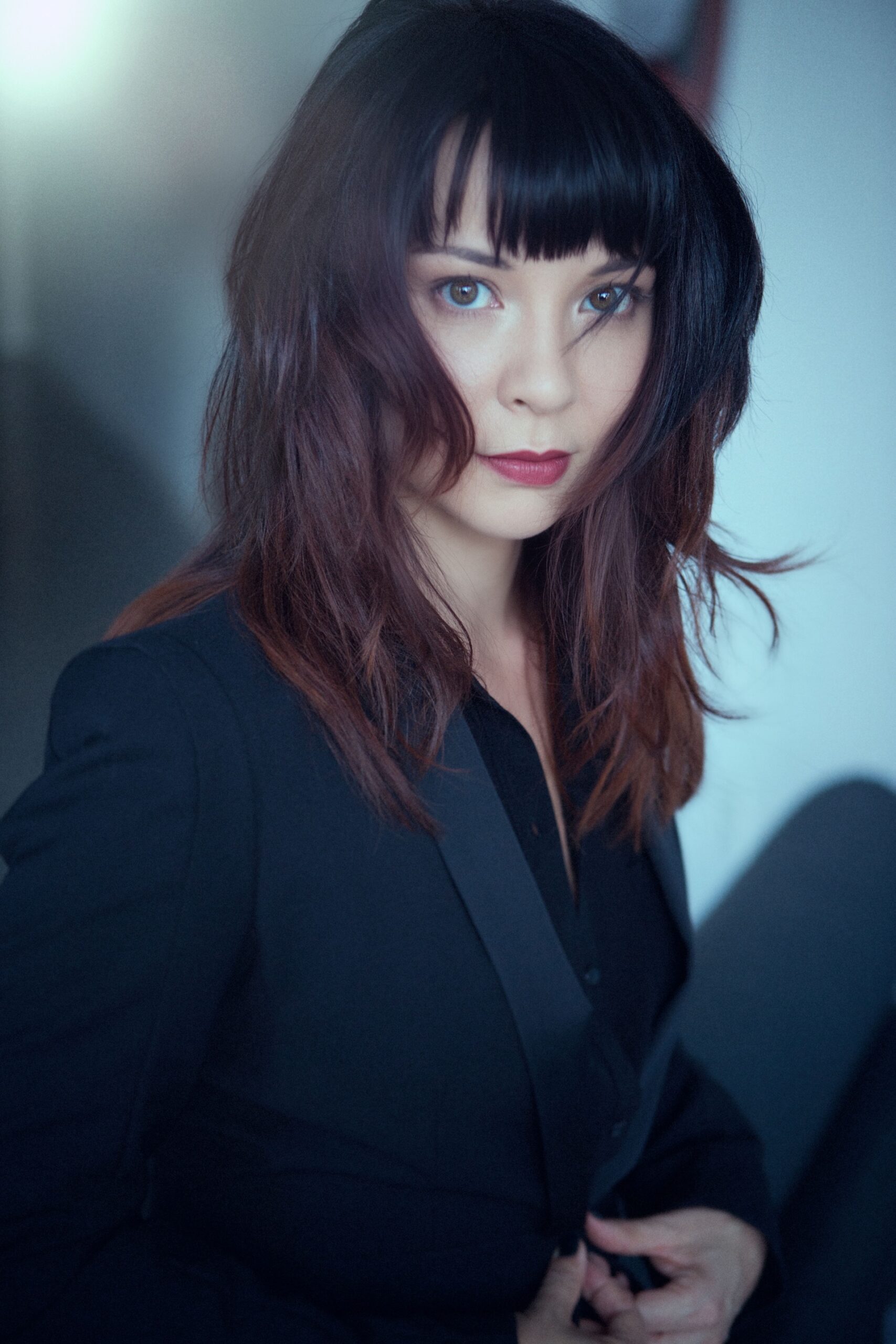There’s all kinds of talent in Vancouver, and recently much like Shawn Bordoff often does, I did an interview with someone from Vancouver. I’d like to introduce you to Tricia Collins, who works as an actress, director, and writer. She has quite the rich heritage of culture of Irish, Chinese, and Guyanese, and her films have already won her some pretty amazing awards. For example, the Best Actress Award at VIFF for her role in her short film Clinch. And who could forget REACH, which was all about her late father’s memories? But it’s not just her own films she’s known for. Tricia has also been in stage productions, like As You Like It, Smart People, and The Unnatural & Accidental Women. Plus, she’s also been seen on screen with other major productions like Supergirl, The 100, The Good Mistress, and Luna: Spirit of the Whale.
As if that’s not impressive enough, she’s finished the WIDC Career Advancement Module AND the Bell Media Diverse Screenwriting Program. Currently, she’s now in the Canadian Film Fest Comedy Igniter, and making her next film BOB. Tricia has so much going on, it’s amazing that I got to speak with her during her free time to learn more about what her past accomplishments and what she’s up to next. Now it’s time for me to share more about her so you can learn about it too. Let’s learn, she has done some teaching as well, even.
HNMAG: You’ve got quite a variety of work in acting and storytelling. What or who inspired you to make such amazing works?
Tricia Collins: Well, I used to work a lot in theatre as a playwright and an actor at this BIPOC and Indigenous diverse theatre called Urban Inc. That inspired me a lot to create my own work, because as actors a lot of us can struggle to get a lot of paid work but if you start to create you have a lot of freedom to tell and control stories.
HNMAG: And with all the three jobs of acting, directing, and writing, how do you balance them all out?
Tricia Collins: I think the hardest time is when I’m trying to all three at once. Yeah, I mean I just try to be quite organized in preparation and pre-production as I possibly can be. As long as there’s many people on board that respect what I’m trying to do and see it clearly ahead of time, then usually when there’s that trust with the team, then usually things fall into place. I’m preparing for the Comedy Igniter. It’s like 1 month to create a comedic short film. I”m pulling all the pieces together and the team together, trying to get them on the same page. I’m going to act in it and also direct.
HNMAG: Yeah, I’ve heard about your involvement in that. How much experience do you have in making comedies?
Tricia Collins: That’s a good question. Everything I like to watch is funny, I’m always telling jokes, but typically the things I’ve created have been dramas. So in it, there’ll be a character that’s quite funny or quirky, but the tone is still dramatic. This is my first comedy I’m making, which will hopefully be one of many.
HNMAG: And you’ve done a lot of roles in the past. Were any of them your dream role?
Tricia Collins: Well, honestly, I have a dream role, and it’s in a play. It’s called The Beauty Queen of Leenane by Martin McDonagh, and I haven’t done that yet, but I would love to do that role. It’s set in the West of Ireland, and it’s about this very bizarre woman that ends up going… crazy (laughs) But yeah, it’s a similar tone to The Banshees of Inisherin.
Speaking of roles, Tricia has done some voice work in a lot of CBC Radio Plays, like Swimming to China and Red Pole Rising. So chances are, you might’ve heard her voice out there at one point too.
HNMAG: I understand you got to partake in the WIDC Career Advancement Module. What did it cover and was there anything you learned from it that you’ll apply to your next production?
Tricia Collins: That was such a great program, it’s a beautiful launch pad for female filmmakers. There are just so many supportive and inspiring women in film that want to help each other. We learned a lot about not just directing like practically on set, it was like how the industry works, the process of pitching. We spoke to one director Winnie Jong and she’s done a lot of comedy, she started with a web series called Tokens and from there it was almost like a calling card she could use and from then on she went to direct a lot of TV series in different types of television. It was great talking to her about it, how to turn something very small into other opportunities. It doesn’t have to be about the budget, it’s more about the concept, the jokes, and how that could be super useful in terms of your career.
HNMAG: And do you hope to take on teaching these newfound tasks in a future seminar or course of your own?
Tricia Collins: Hm, in the past I’ve taught screenwriting. Really, it was the content development module where you’re making a bible and developing all the narratives and story arcs beforehand, then creating the script later. It was a course before I taught acting a fair bit. Next, I could do that, it’d be cool to get on the other side of comedy to create it. But for right now I want to make all of it then maybe eventually to do that.
HNMAG: You also were elected to be in the Bell Media Diverse Screenwriting Program. What did you learn from that to help you with your writing?
Tricia Collins: I’m mixed race, so my dad was Irish and my mom’s from the Caribbean. My project kind of fused together cultural influences from the Caribbean, like different stories and mythologies that I may have heard from Mom and her side of the family. That got woven into what I was writing, and that experience helped me to create something culturally specific but could also resonate with anybody. It didn’t really your background once you understand a human experience It can really connect you with a lot of people, so I think I learned not to be afraid not to bring that into my storytelling for various audiences.
HNMAG: How did you get into it even? Was it a standard application?
Tricia Collins: That program’s over, but you had to apply, talk about yourself, it was a bio-sevier experience as well as write about yourself. I think that they wanted a concept, something you were going to develop.You come in with an idea, and then develop it when you’re there. It was great, a lot of people talked from the Writer’s Guild, the show runners of America, just to help you shape what you were working on. Learn how to pitch and work in a writer’s room.
A lot of Tricia’s accomplishments are truly amazing as I have said. She doesn’t just do big production content, but also has helped to produce local community-based and interactive projects, like Fathom Labs Highway, Standing-Ground.ca and #herdigitalvisions. Those covers subjects like climate justice, online bullying, and representation of the Indigenous. Those are all important subjects that can’t be stressed hard enough. Plus she worked with youth in the Access to Media Education Society, but that’s an interview question for just a little bit later.
HNMAG: And regarding the films you have made, like Reach. How do you get inspiration to make these compelling films?
Tricia Collins: Reach is my first short. It’s a little bit of a sad story, I was on my way to do my master’s at Ryerson (now Metropolitan) University a week away from leaving and I had this whole concept for my master’s thesis about working with film and media. Then my father got sick, he had quite a bad stroke and that was quite traumatic. I was going to quit the program and stay home. My mom said, “Don’t do that, just stay and work in the writer’s room” so I changed my thesis completely and made it all about my dad. Memories and what he could remember, because with a stroke and dementia, your memory is fading quickly. Throughout the whole year, I would go back and forth just spending time with my dad, writing down his stories. Anything he could remember about Ireland, and going there. I turned that into two movies: Reach, and a short documentary. It was a very personal connection I had to my first short.
HNMAG: And you have theatrical work that you’ve done too. Has any of it ever been adapted into a film production of sorts?
Tricia Collins: I tried to turn one short play act into a short and it didn’t come out too well. That was called Dreaming Elevators, and so the play was a one-act about an older homeless man and a younger corporate executive. They have dreams about each other where they meet. The homeless man is walking and smoking joints. Eventually he finds the young executive and it’s a father and daughter relationship. I wrote it into a short film but filming takes a lot of resources, so maybe I will do that one day. Just that one, the other plays I haven’t tried to adapt them.
HNMAG: You also served as producer and co-director for projects in Access to Media Education Society. How was that experience?
Tricia Collins: I did that for 4 years, it was really inspiring. I think when you’re working with younger people like teens. One program I worked on was Her Digital Vision which was for tween girls and teens mostly from 8 up to 14 or 15 years old. I found when they learned how to create, you could sort of see them blossom and change. That for me is the most rewarding, when you see a young person changing because they’re seeing what they can do and what stories they can tell. Later on we did some interviews with former students 20 years later. They’re still telling stories or they’re also filmmakers, because of what the program did for them many years ago. It was a great experience.
HNMAG: And as the owner of your own film company, Perseverance Pictures, what kind of productions are your favourite to make?
Tricia Collins: I do a lot of corporate videos, but my favourite is when it’s original, narrative, and magic realism. Sort of a little bit surreal storytelling, those are my favourites.
HNMAG: And you’ll want to do more comedy as well after the Canadian Film Fest Comedy Igniter.
Tricia Collins: Yeah, that’s the plan.
HNMAG: And in regards to making comedy, do you have all kinds ready to come up with? Where have you drawn inspiration from?
Tricia Collins: For this one, they give you a prompt. There’s a female comedian in Toronto and she’s going to give us something. It could be a line of text, it could be a prop, I’m not sure but it has to be put into the film. I have some other potential ideas I’ve written down, I’d like to make a movie. A chapter feature maybe, it might be like a web series that I piece together to make one movie. It’s a concept from a play that one of my friends wrote.
What an amazing talent, Tricia is doing so well. I can’t wait to see her comedy film and the other productions she makes. I just might be going back to film festivals real soon, so I hope to see her productions screening there, and I hope to see a big turnout for them as well.


